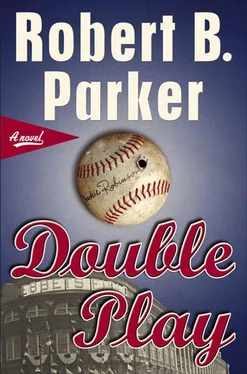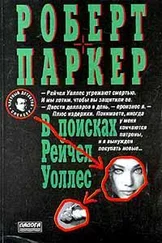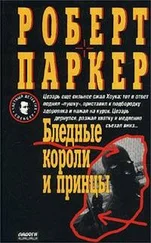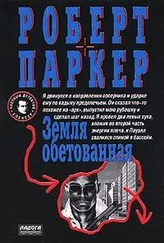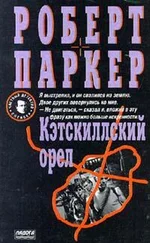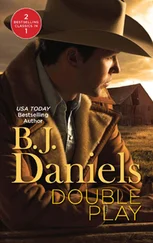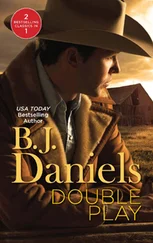“Sure.”
“And?”
“And we build you a rep,” Anthony said.
“And?”
“And we get you couple big money fights, and maybe me and Angelo bet some side money and...” Anthony made a waffling gesture with his right hand.
They were drinking I.W. Harper on the rocks.
“What makes you think I can do it?”
“In the Corps,” Anthony said, “I seen you kick the crap out of a couple guys. That big Polack from Scranton, what was his name?”
“Starzinski.”
“And the guy from Birmingham, Alabama?” Anthony said.
“I go in the tank sometimes, too?”
Anthony drank the rest of his whisky and gestured at the bartender. He smiled.
“ ’Course,” he said.
“Okay.”
They hired a trainer and got him ready. He learned quickly, and after a time no one wanted to spar with him because he seemed not to feel pain, and he came at everyone with a kind of expressionless ferocity that scared even some of the thick-scarred aging Negroes who’d been doing this most of their lives. When they thought he was ready they put him in with a string of palookas. Burke never knew if the fights were fixed or not. It didn’t matter. In every fight he went out and attempted to kill his opponent. He won eighteen fights in a row and they began to have trouble getting him matches. Other fighters began to avoid him. Finally they put him in with a tall fighter named Tar Baby Johnson, who had a 35–22 record. For seven rounds Burke went implacably after him, absorbing every punch that Tar Baby threw. He landed very few of his own. Those he did land were mostly on Tar Baby’s arms. In the eighth round Tar Baby knocked Burke out with a combination that Burke never saw. Fighters who had beaten Tar Baby Johnson then agreed to fight Burke. Anthony and Angelo dodged them for a while and Burke pulverized several other fighters who fought as Burke did, straight ahead, getting by on toughness. But eventually they had to take another opponent who could box, another rangy black man named Kid Congo, who looked positively delicate opposite Burke’s thick white muscularity. Burke was KO’d in the fifth.
“There’s fighting,” Anthony said to him, “and there’s boxing. You could beat both these guys up in some alley someplace. You’re like a fucking wolverine. But, you got no future in the sweet science.”
Sitting in the reeking cinder block room, holding the ice bag against his face, Burke nodded. It hurt. Burke didn’t pay much attention to the fact that it hurt. Most things hurt. Burke was used to it.
“It’s our fault,” Anthony said. “We shouldn’t have put you in with the Tar Baby yet. We was supposed to build you up until you got a rep, and then bet heavy and maybe you take a dive for us. But the Tar Baby fucked that up. Make big money on a dive you need to be a heavy favorite, you know?”
Burke shrugged. He got dressed slowly. The scars from Bloody Ridge had faded into insignificant white lines across his belly. His face was swollen. One eye was closed. On the other side of the dressing room, Kid Congo was holding ice against his forearms where Burke’s heavy punches had landed. The arms were swollen. He saw Burke looking and grinned.
“You got the heaviest punch I ever seen,” he said.
“I know.”
“But you can’t box for shit.”
“I know.”
“He’d kick your ass on the street,” Anthony said to Kid Congo.
“Don’t know if he would or not,” Kid Congo said. “But kicking my ass on the street ain’t what this all about.”
Anthony said, “Watch how you talk, black boy.”
“He’s right,” Burke said to Anthony.
Anthony shrugged. Kid Congo slipped into his pink shirt and nodded at Burke and walked out of the dressing room.
“You know my brother Angelo books some bets now and then,” Anthony said.
Burke nodded again.
“He could probably use you to collect some of the proceeds.”
“Okay.”
“Most of the time they’ll just give it right up,” Anthony said. “Even if they don’t want to, you’ll scare them and they’ll do it.”
“And if they don’t?”
Anthony shrugged.
“You reason with the fuckers,” he said. “Money’s good. Hours are good. Better than getting knocked on your ass every few weeks by guys like Tar Baby Johnson and this coon. Okay?”
Burke shrugged.
“Okay.”
When I was a small boy and we still lived in Springfield my mother would disapprove of my behavior by saying it was as if I lived on Columbus Avenue, which was, in those days, a Negro neighborhood.
I knew that a white fighter named Billy Conn almost beat Joe Louis at the Polo Grounds until he got careless in the thirteenth round. All of us rooted along with the rest of America, or almost the rest, that a white fighter would beat Louis (as long as it wasn’t Schmeling). Conn was the closest we got. Lou Nova failed, and Buddy Baer, and Two Ton Tony Galento. I knew that there was a race riot in Detroit in 1943 and President Roosevelt had to send in army troops. I was never clear how it worked in the war, but I was pretty sure Negroes and whites didn’t serve in the same units.
I knew that my father would give me a nickel, every Saturday, and I would go up to Wolfe’s drugstore on the corner of my street and buy five licorice candies called nigger babies. I knew that the Brazil nuts in the nut mix my mother put out at Christmas were called nigger toes. I knew that there was a high lawn weed, which when it went to seed was called a nigger head. If something was brightly shined my mother would describe it as “shining like a nigger’s heel.” People who spent money foolishly on ostentation were nigger rich.
In my childhood that was what I knew of black people. I had no personal contact. There were none at school. Until we moved to New Bedford, I don’t think I ever met a black person. I don’t remember my father ever working with a black person. To my knowledge my mother never knew one. Black racism was, thus, a kind of abstraction. One knew it was coarse to call someone a nigger. Impolite. But one didn’t worry that they’d move into the neighborhood. It was unthinkable. And no one, in my memory, ever thought about it.
The more immediate threat was Jewish. They could often pass, if one wasn’t alert. In 1944 when my father was transferred to New Bedford they sold their Springfield home to a gentile for $500 less than they had been offered by a Jew. My father had no comment on that. My mother explained that selling to a Jew would betray our neighbors. On the other hand, our family doctor was my father’s friend Sam Feldman. I found this unsettling.
In fact, long before I should have, long before I had any information to the contrary, I was suspicious of judgments based on race. I do not know why this was. When we were just barely postpubescent my friends and I, who had never had sex with anyone, and were years away from doing so, would discuss very seriously whether one of us would have sex with a good-looking Negress. Lena Horne was our most frequent example. I always insisted I would. Some of that insistence was merely an honest appraisal of my feverish hormonality. But there was also a sense that to do otherwise, for racial reasons, would be wrong. Embarrassingly that is, to my memory, my first public position on racial equality. The question of whether Lena Horne would have wanted sex with any of us was never considered.
Later I would read Kingsblood Royal, and watch Home of the Brave and find my suspicions about racial attitudes confirmed. But the suspicions existed prior. Perhaps I simply exemplified a happy quirk of nobility. It would be pretty to think so. On the other hand, years past childhood, as an adult, in psychotherapy, I discovered that I was able to keep my most aggressive impulses in check because I identified with the object of my own aggression. I identified with the victim. Maybe that had something to do with it, too.
Читать дальше
